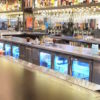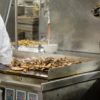Restaurants are not only places to nourish our bodies, but also places to enjoy conversations with friends, family and co-workers. If your restaurant’s vent hood system is not installed correctly and operating efficiently, it’s possible that it’s costing your restaurant money in excess energy usage, decreased employee productivity and even lost business.
Employee Productivity
A clean restaurant is a motivator to both its employees and customers. Improperly functioning kitchen ventilation translates to greasy and odorous air from the cooking operation that lingers in the kitchen. This can significantly interfere with employees productivity levels, potentially costing your restaurant business with lead times and a decrease in quality in both back of house and front of house operations.
Customer Discomfort
If the air in your restaurant is compromised due to inefficienies in kitchen ventilation, the situation often results in discomfort to customers in the front of house. Clean air in your restaurant helps to ensure that customers have a good experience and helps increase the possibility of them returning.
Utility Bills
An improperly sized or improperly installed vent hood in your restaurant’s kitchen can result in greater energy consumption than necessary. If the system is too powerful for your cooking operations and a demand control is not in place, this is just wasted energy.
Systems that are not cleaned regularly become inefficient. They have to work harder to pull the same volume through the ducts. Overworking the system leads to more energy consumption and this is reflected on the energy bill. To save on energy usage, ensure that all vent hoods are installed correctly and well-maintained.
Ventilation System Balancing
All machinery requires regular repair and maintenance to function optimally. Your restaurant’s vent hood system is no different. An excess of smoke accumulating in your kitchen is a clear sign that your ventilation is unbalanced. The impure air is a health hazard for both your employees and customers. To ensure that you do not lose the two critical stakeholders of your business, it is prudent to consult a trained and experienced technician for balancing. A re-balanced exhaust and remake air for your restaurant will ensure your kitchen is safe for operation and too much energy is not consumed.
Suction Maximization
Running an efficient ventilation system in your restaurant is not as expensive as you might think. In an effort to ensure that its operation is efficient, cooking equipment should be positioned directly below the hood to ensure that smoke and heat emanating from them is removed immediately. As a result, clean air is not sucked up from behind the cooking equipment, and this offers a maximum hood area over your cooking line. Side panels are another option to increase the efficiency of your hood installation.
Ventilation Control
A demand control for your restaurant’s ventilation system goes a long way towards saving you money. This control system senses the cooking volume in your restaurant’s kitchen and regulates the speed of the exhaust fans accordingly. Demand controls typically reduce energy usage from the kitchen exhaust syste by a whopping 30 to 50 percent. If your ventilation system lacks a demand control, then it may be time to consider installing one.
Vent Hood Overhang Extension
Is your hood overhang big enough to cater for your commercial kitchen’s needs? If not, it’s time to extend it. A five to six foot hood is a common size for restaurants that need to capture a large amount of smoke. This helps ensure that your cafe runs on clean air and guarantees that the ehxaust system functions more efficiently.
Grouping Heavy Cooking Equipment Together
The cooking equipment used regularly should be placed strategically underneath the hood. It is prudent to separate heavy cooking appliances in your restaurant’s kitchen from the lighter cooking equipment to make sure your exhaust fans are operating according to volume. This way, you will avoid under-utilizing your fans with mismatched equipment under the same hood.
Hood Filter Cleaning
Your exhaust system’s hood filters capture and trap the grease in the air being blasted out of your system. If your filters are not regularly cleaned and maintained, grease build-up within the ducts and upblast fans may occur. Grease buildup is a potential fire hazard for your restaurant that is best avoided. Making sure your hood’s filters and the entirety of the system is routinely cleaned is key to preventing potential costly loss by fire.
Like every restaurant owner, you expect your kitchen’s ventilation system to be operating efficiently. A routinely cleaned and maintained system will help ensure that your restaurant is an enjoyable place for eating and relaxing with good company. Transform new visitors into loyal customers with a properly installed, well-functioning hood system for your restaurant.




